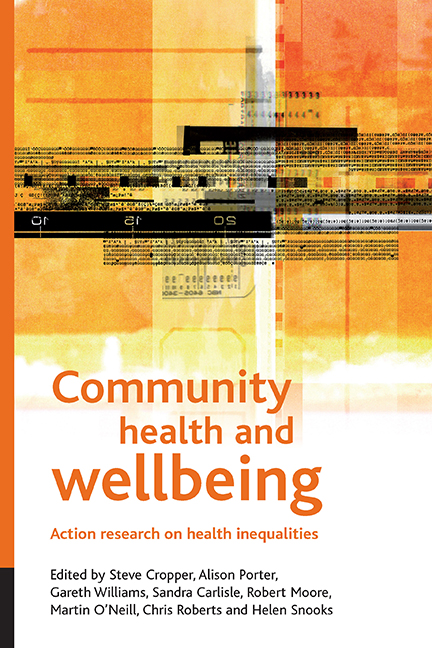Book contents
- Frontmatter
- Contents
- List of tables and figures
- Preface
- Acknowledgements
- Notes on contributors
- one Health inequalities in their place
- two ‘Policy experiments’: policy making, implementation and learning
- three Policy innovation to tackle health inequalities
- four Action research partnerships: contributing to evidence and intelligent change
- five Engaging with communities
- six The role of the community-based action researcher
- seven Evaluation, evidence and learning in community-based action research
- eight Social theory, social policy and sustainable communities
- nine Beyond the experimenting society
- Index
- SHARP DVD: A Way of Working Together to Improve Our Lives
seven - Evaluation, evidence and learning in community-based action research
Published online by Cambridge University Press: 15 September 2022
- Frontmatter
- Contents
- List of tables and figures
- Preface
- Acknowledgements
- Notes on contributors
- one Health inequalities in their place
- two ‘Policy experiments’: policy making, implementation and learning
- three Policy innovation to tackle health inequalities
- four Action research partnerships: contributing to evidence and intelligent change
- five Engaging with communities
- six The role of the community-based action researcher
- seven Evaluation, evidence and learning in community-based action research
- eight Social theory, social policy and sustainable communities
- nine Beyond the experimenting society
- Index
- SHARP DVD: A Way of Working Together to Improve Our Lives
Summary
Introduction
Policy makers, professionals of all kinds and the general public now recognise a wide range of social factors as important determinants of health; if community health interventions can help to address such factors, they can play a valuable role in protecting and improving health and wellbeing (Shediac-Rizkallah and Bone, 1998). Publicly funded approaches that develop community capacity and connectedness may also promote stronger partnerships between communities and service providers, potentially leading to more appropriate forms of service provision. Yet, despite a high volume of research across the UK and elsewhere describing the problem of health inequalities, there is still comparatively little intervention research that helps to identify practical responses. There is also a growing expectation of ‘evidence-based practice’, which exerts great pressure to evaluate the effectiveness of community-level health interventions, although with regard to ‘what works’ at community level, there is a gap between the rhetoric of evidence-based policy and what happens on the ground, which is known to be far more complicated (Coote et al, 2004). There are thus questions about how such interventions should be evaluated and what constitutes ‘evidence’, especially when applied to novel approaches such as action research.
The SHARP initiative has focused on generating learning and evidence from community-based action research that will be of use for policy and practice to address health inequalities. This chapter argues that learning and evidence can take many forms in this type of intervention, so we need to cultivate a broader understanding of what works, for whom, and at what cost. The philosophy, assumptions and principles on which community-level research is based have implications for both methodology and methods, and therefore the evidence produced.
We begin by summarising some challenges in evaluating community-based initiatives to improve health and wellbeing. We then introduce the question of what constitutes evidence and learning in the community setting for action research provided through the Sustainable Health Action Research Programme (SHARP). We describe the different approaches to evaluation and evidence taken by participants in one project, and by the overarching evaluation team whose responsibility it was to draw comparative lessons from all seven. We explain the different purposes and principles underpinning these levels of evaluation, the forms of evaluation questions asked, and the links between these and methodological choices around design, process and conduct.
- Type
- Chapter
- Information
- Community Health and WellbeingAction Research on Health Inequalities, pp. 147 - 170Publisher: Bristol University PressPrint publication year: 2007



